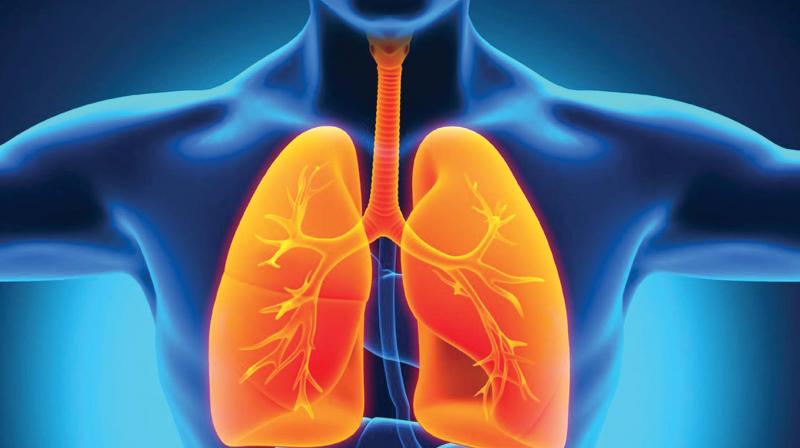Be nourished to fight Tuberculosis
It is proven that tuberculosis leads to undernourishment and undernourishment to tuberculosis.

The Centre recently unveiled the National Strategic Plan for Elimination of Tuberculosis, aimed at reducing the incidence of TB from 217 new cases per 100,000 to fewer than 44 new cases by 2025. Whether it is the Prime Minister’s unequivocal commitment or the vision envisaged in National Strategic Plan 2017-25 or concerted efforts through already existing National Tuberculosis Control Programme, India’s push towards eradicating TB by 2025, five years ahead of the global elimination target of 2030, is unambiguous. However, in its march towards TB-Free India, the country needs to arrest the scourge of under-nutrition.
The relationship between nutrition and tuberculosis is inextricable and bidirectional - TB leads to under-nutrition and under-nutrition is considered a risk factor for developing TB. This could be either by reactivation of latent TB or developing progressive primary disease via infection. It is also proven beyond doubt that under-nutrition leads to worse treatment outcomes once TB has developed.
Studies across a variety of socioeconomic settings globally, with different levels of TB burden, have shown a strong and consistent log-linear relationship between the Body Mass Index (BMI) and TB incidence. It is estimated that each unit reduction in BMI, the risk of TB could increase almost by 14 percent. A candid view of any national level data indicates that the distribution of under-nutrition is highest among younger age groups, women, rural people, marginalised social groups and people in the lower quintiles of the wealth index.
A notable finding in this study was that among the youngest age group (15-19 yrs), up to two-third of incident TB cases could be attributable to under-nutrition. Modelling showed that in India, about 50 per cent of TB cases could be attributed to under-nutrition, implying that improving nutritional status could have a dramatic impact on TB incidence.
It is estimated that 55 percent of deaths in children below the age of 5 years with infections are associated with under-nutrition. Nevertheless, complete recovery is certain with adequate nutrition and timely medication. In children, tuberculosis can severely hamper weight gain and linear growth. To prevent weight loss and to promote normal growth in children with tuberculosis, additional intake of energy (150-200 KCal / kg/d) and protein (4g /kg/d) must be ensured. Children from low socioeconomic groups, who live in compromised environments, do not have access to enough macronutrients like proteins and calories during convalescent period and therefore their catch-up growth often does not occur resulting in weight loss and stunting. Children given additional calories and proteins show catch-up growth seven times more than normal growth.
In a country that bears over a fifth of global burden of malnutrition and a fifth of TB burden, integrating nutritional support in TB Programmes is as important as tackling the problem of under-nutrition. Strategies for TB care and support that deserve attention in India no doubt include better awareness, early diagnosis, improved access to anti-TB medication, detection of drug resistance and treatment completion. Nutrition, however, is an often-ignored, vital aspect. Nutritional support programmes for TB patients have proven to be effective in a few states on experimental basis. No wonder it has been effectively integrated in the new revised programme that aims to eradicate TB. In addition, the recent budget also has made a provision for introducing direct cash transfer to TB patients to help them tackle the issues of food and nutrition security.
Nutrition care and support for TB patients and TB preventive care among the undernourished should both be taken up on equal footing. When under-nutrition is identified at the time of TB diagnosis, TB must be considered a key cause. Similarly, when under-nutrition is persistent, TB-related awareness should be integrated as part of rehabilitation. Nutritional assessment and counselling should be considered vital parts of TB treatment and care and the health functionaries need skill enhancement. Some studies also show that TB is commonly accompanied by co-morbidities like HIV, diabetes, smoking and alcoholism, which can in turn have nutritional implications, and these should be considered during nutritional assessment, counselling and support. It should be borne in mind that nutritional assessment and support may vary according to the age, gender and physiological status of the patients.
In the context that both nutrition and TB eradication are high on our agenda, one approach would be to think of dedicated nutrition workers/volunteers at grassroots-level who could support both nutrition counselling and TB awareness. The potential of ICMR-National Institute of Nutrition and other available nutrition departments in universities can be harnessed to build nutrition counselling and support capacities of grassroots-level health functionaries. Advocacy campaigns that use diverse media platforms should also emphasise on nutrition angle such as weight loss, under-nutrition in addition to creating awareness about symptoms and available medical care, which are already being highlighted.
The global TB eradication community is looking at India, whose commitment is unambiguous toward both early eradication of TB and combating malnutrition. This moment in history is yet another opportunity for the country to piggyback its commitment to tackle under-nutrition on yet another national programme that aims at taking rapid strides toward TB-Free India. After all, nutrition is a necessary, if not a sufficient condition, in our march toward TB-free world.
(The author is director, ICMR-National Institute of Nutrition, Hyderabad/ directornin@ninindia.org)

